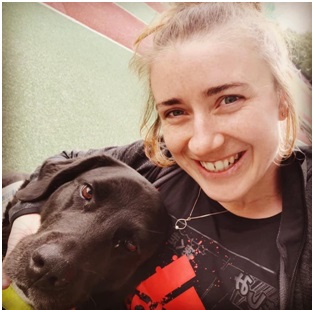As Co-Chairs of the Disability Network we’ve had a look at some people with disabilities who have inspired generations of people with their incredible achievements and some inspiring local young people: Libby Clegg and Zoe Irving. We asked Scottish paralympic sprinter and tandem track cyclist Libby Clegg, MBE to contribute to our blog. Libby has Stargardt’s Macular Dystrophy disease, which has left her registered blind. Her contribution is below.
Despite being a 2 x Paralympic Gold medallist, 3 x Paralympic Silver medallist, having a host of other medals, coming 3rd on Dancing on Ice, being a Mum to a young son and being a published author, Libby remains modest and humble as you will see in the her words below.
Libby makes no mention of her accolades such as the MBE that she got in 2017 for services to athletics and charity, or the fact that she was given an honorary Doctorate from Glasgow Caledonian University in November 2023 for her outstanding achievements. Libby appeared on Great British Dog Walks with Phil Spencer with both Hatti and her new dog Bramble earlier this year.
Libby Clegg MBE
‘Many people may have seen me on television, running on the international stage at Paralympic Games or competing on “Dancing on Ice”.
I’ve been incredibly fortunate to have had many opportunities and unbelievable experiences over the years. When I got diagnosed with my condition at nine years old, I would never have imagined my life would have turned out this way. Disability growing up was never seen in a positive way, it was always about what you couldn’t do not about what was possible.
During my successful career, I’ve had many ups and downs and sometimes what is seen on television isn’t always the whole story. In my day to day life I face the biggest struggles, navigating new places, meeting new people, trying to read post, labels, just to name a few.
These challenges and barriers can leave me feeling very anxious, awkward and uncomfortable at times. It’s something I don’t look forward to experiencing. However, I’ve managed to learn how to push through some of these difficulties, predominantly because I wanted to fulfil my dreams and ambitions in sport. I knew it wouldn’t be possible if I didn’t work through these things.
I’ve managed to do this by pretending to feel confident and not care what people think of me. It’s taken me a long time to get to a place where I feel secure in who I am. I’d encourage anyone who has had a similar experience to keep persevering and be kind to yourself.
Libby’s book ‘My life with Hatti: Six Years with a Dog Who Does Everything’ is available on Amazon.
We would like to sincerely thank Libby for making time to share her experience with us and her Mum (Moira) for being our go between.
Zoe Irving
Zoe Irving is a young athlete from Langholm, she has a learning disability and is visually impaired. This has not stopped her from excelling at her chosen sports.
Zoe is a very active member of the Dumfries and Galloway Disability Sport team and she has participated in competitions at all levels in the UK and as far afield as Abu Dhabi in the United Arab Emirates (UAE) where she participated in the Special Olympic World Games in 2019 and won gold in the bocce.
This year’s achievements alone have included gold medals at boccia competitions in Dundee, Perth and Stirling.
Although Zoe has played boccia and bocce for a few years she took up tennis fairly recently. She is a natural and has already won several medals. In July she won gold in the singles and silver in the doubles at Stirling. At the LTA National Finals in Bolton she won a silver medal. The very next day she travelled to Newcastle to finish this years completion’s with another gold medal in boccia.
Zoe’s family and friends are extremely proud of all her achievements. Zoe’s sporting accomplishments are down to her own skill and determination but also a testament to unstinting support of her parents and the hard work and dedication of the fantastic coaches at Dumfries and Galloway Disability Sport.
For more information about disability sport in Scotland please look up http://www.scottishdisabilitysport.com or check out the Dumfries and Galloway Disability Sport Facebook page.
Franklin.D. Roosevelt
Franklin Delano Roosevelt was first elected President of the United States in 1932 the 32nd American president. Stricken with polio in 1921, when he was thirty-nine years old Roosevelt spent much of his adult life in a wheelchair.
Franklin Roosevelt’s crusade to defeat polio actually began more than 10 years before he created the group that would become known as the March of Dimes. His first efforts centered on a therapeutic spa in Warm Springs, Georgia, famed for the recuperative benefits of its water treatments.
Roosevelt was first treated at Warm Springs in 1924–three years after his own devastating bout with polio–and was immediately impressed with the results. He soon became a frequent visitor, and within three years he had bought the property and created the nonprofit Warm Springs Foundation, which established the springs as the first hospital in the nation to focus entirely on the treatment of polio victims.
Re-elected by comfortable margins in 1936, 1940 and 1944, FDR led the United States from isolationism to victory over Nazi Germany and its allies, FDR, as he was often called, led the United States through the Great Depression and greatly expanding the powers of the federal government through a series of programs and reforms known as the New Deal.
The New Deal Roosevelt began to take shape immediately after his inauguration in March 1933. Based on the assumption that the power of the federal government was needed to get the country out of the depression, the first days of Roosevelt’s administration saw the passage of banking reform laws, emergency relief programs, work relief programs, and agricultural programs.
Later, a second New Deal was to evolve; it included union protection programs, the Social Security Act, and programs to aid tenant farmers and migrant workers. New Deal programs helped improve the lives of people suffering from the events of the depression. In the long run, New Deal programs set a precedent for the federal government to play a key role in the economic and social affairs of the nation.
He spearheaded the successful wartime alliance between Britain, the Soviet Union and the United States and helped lay the groundwork for the post-war peace organization that would become the United Nations. The only American president in history to be elected four times, Roosevelt died in office in April 1945 from a cerebral haemorrhage.
Ralph Braun
Ralph Braun when he was six years old, doctors diagnosed him with muscular dystrophy. He started using a wheelchair at the age of 14. At the age of 15, he created a motorized wagon with his father to help him get around. Five years later, Braun created a motorized scooter, which he called the Tri-Wheeler, using various parts from his cousin’s farm. Ralph rode the Tri-Wheeler to and from his day job as a Quality Control Manager for a nearby manufacturer. When the facility moved several miles away, he equipped an old mail carrier Jeep with hand controls and a hydraulic lift, enabling him to drive his Tri-Wheeler in and out of the vehicle unassisted.
In 1970, Dodge manufactured the first full-sized, front engine van. Braun retrofitted a Dodge van with a lift and called this new invention the “Lift-A-Way” wheelchair lift. When word spread about this new invention, Braun assembled a team to help fill orders across the nation, all from his parents’ garage. As demand increased, Braun decided to quit his full-time job to focus on his part-time business
Braun started “Save-A-Step” manufacturing in 1963 to build the first motorized scooter, made from a lawnmower differential, four big wheelbarrow tyres, two 6-volt automotive batteries, makeshift wiring and switches from a hardware store, a kitchen chair, and a motor from a 1957 kid’s car that he rescued from a mortician’s dustbin”. In 1966 Braun created the first wheelchair accessible vehicle, by creating a wheelchair platform lift and hand controls that were added to an old Post Office Jeep. In 1970, Ralph added wheelchair platform lifts to full-sized vans. “Save-A-Step” was incorporated under a new name, The Braun Corporation, in 1972.
Stephen Hawking
Stephen Hawking is a world renowned theoretical physicist, cosmologist and best selling science author. He also had regular cameo appearances in the Big Bang Theory. He got his PhD at 24 years old, 3 years after being diagnosed with amyotrophic lateral sclerosis (also known as motor neurone disease or MND). He said that being given 3 years to live when he was diagnosed motivated him to achieve his goals.
As the disease progressed, Hawking became a wheelchair user and ultimately became paralysed and lost his ability to speak. He thereafter used technology which translated his eye movements to generate a digitised voice to enable him to communicate and carry on his work.
Hawking was the Lucasian Professor of Mathematics at the University of Cambridge for most of his career. Sir Isaac Newton also held this position when he was a professor there.
Hawking was a renowned and respected science communicator. His achievements are deeply impressive on their own, but it could be said that this was even more remarkable given the physical impact the disease had on his body.
His book “A Brief History of Time,” published in 1988 was on the Sunday Times bestsellers list for 237 weeks.
Such was his respected status, when Hawking died in 2018, his ashes were placed in London’s Westminster Abbey between the final resting places of Sir Isaac Newton and Charles Darwin.
Jamie Oliver
Jamie Oliver was diagnosed with ADHD (attention-deficit hyperactivity disorder) and dyslexia as a child. He has since advocated for a healthy diet to help ease the symptoms (for ADHD, the NHS cites these as fidgeting, an inability to still and concentrate, while for dyslexia, these include reading slowly or making errors when reading and writing), and often speaks out about his own experience.
Dyslexia and ADHD often overlap (three in 10 people with dyslexia also have ADHD), and in a past video shared by charities Made by Dyslexia and the ADHD Foundation, Jamie opened up about the challenges he faced in education as a result of suffering with both disorders.
When Jamie was at school, dyslexia was never really a thing; you were either almost blind or not dyslexic. Jamie was just put in special needs class because of his dyslexia..
“Jamie has expressed his love of debate about education. Who said education is what we say it is? Like a couple of people from 500 years ago sort of set up the structure of it, English, maths, science. Ok, so if you’re not good at black and white and traditional academia you’re thick, therefore you have no value, so for me personally I’ve always been passionate since leaving school about different types of intelligence and everyone has the ability to be brilliant.
“School really should be about facilitating kids to find their inner genius and inner confidence.” Jamie left school with no qualifications but went on to secure a place at Westminster Catering College, where he nurtured his passion for healthy children’s cooking.
Liz Forsyth is a Strategy Support Manager and Clark Adams is a Carer Facilitator and both Co-chair the Disability Network




Liz and Clark
Good to be reminded of the contribution that people with disability make to society. Really inspiring stories